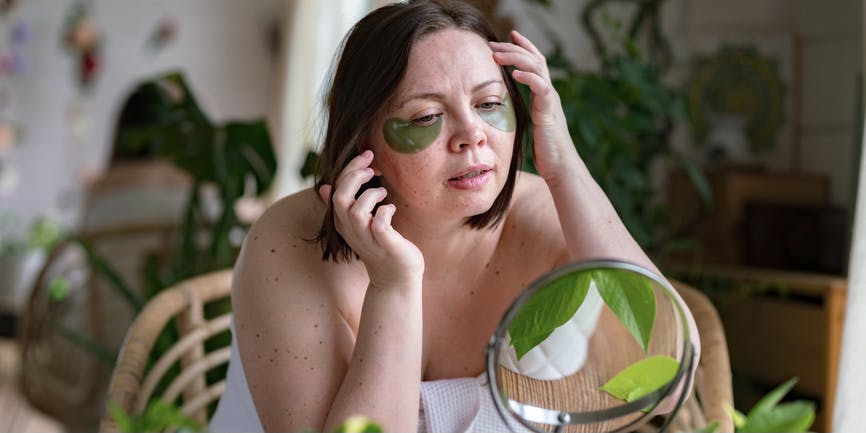
Is rosacea an autoimmune disease?

Topics
Key Points:
- Rosacea is a skin condition that causes redness, skin darkening, bumps, pimples, flushing, and visible blood vessels on the face. These can appear alone or in combination.
- Rosacea is not an autoimmune disease. But it can sometimes be linked to autoimmune diseases.
- Lupus and acne vulgaris can cause similar symptoms—but they’re treated differently. So it’s important to talk to a dermatologist about your symptoms.
Rosacea is a common skin condition. On fair skin tones, symptoms of rosacea include redness, flushing and visible blood vessels. On dark skin tones, it can look like skin darkening or a dusky brown coloring. It can also create bumps or pimples on the face.
This condition usually appears in adulthood. It often gets better for a while and then flares again—what’s known as a relapsing-remitting condition.
What causes rosacea?
Researchers aren’t sure. Some studies suggest it’s caused by immune system issues. Others imply that people with this condition have a problem where their body tells tiny blood vessels in their face to get bigger.
Scientists have also found heightened amounts of Demodex mites on the skin of those with this condition. But we don’t know if these are the cause or result.
There may also be a link between environmental triggers and genetics. Some people could have slight changes in their DNA that make them more likely to develop rosacea if they encounter triggers. These many triggers include sun, stress, irritating skin care products, eating spicy foods and drinking alcoholic beverages like red wine or white wine.
The bottom line? If you have this condition, you didn’t do anything wrong! A licensed medical provider can help you find the best treatment—from topical lotions to rosacea pills!
Is rosacea an autoimmune disease?
No. It shares similarities with autoimmune disorders. But it’s not an autoimmune disorder in itself.
An autoimmune disease happens when the body mistakenly attacks its healthy cells. With rosacea, the skin isn’t attacking its own cells. Instead, the immune system responds as if the skin is under attack. This then inflames and creates sensitive skin.
New research does suggest a link between rosacea and other autoimmune diseases. One large study found a connection in women who also have autoimmune diseases like 1 diabetes, celiac disease, multiple sclerosis and rheumatoid arthritis.
This suggests that genes related to autoimmune diseases may contribute. It also means that women who have rosacea might be at higher risk for autoimmune diseases.
Does lupus cause rosacea?
No, it does not. Rosacea is an inflammatory condition that affects the skin. Lupus is an autoimmune disorder that can affect the whole body.
But they do share some similar visible symptoms. Cutaneous lupus erythematosus can cause a rash that mimics early rosacea. It’s often called a “butterfly rash” because it spreads across the inner parts of the cheeks and nose. Lupus can similarly be triggered by a combination of genetics and environmental factors like UV light or certain medications.
Despite the similarities, lupus and rosacea treatment plans differ greatly.
Who diagnoses rosacea?
A licensed dermatologist can help you understand the cause of your symptoms. Similar skin conditions include:
- Acne vulgaris (the type of acne more common in teens and young adults)
- Folliculitis
- Systemic lupus erythematosus
- Photodermatitis
- Perimenopausal flushing or emotional flushing
- Seborrheic dermatitis
- Perioral dermatitis
Each condition requires different treatment. So it’s important to talk to a board-certified medical provider to understand what’s causing your symptoms.
Skin care tips
While there’s no cure for rosacea, a good skin care routine can help you prevent a rosacea flare and manage symptoms. It can also help your rosacea medicine work better in the long term.
- Wash your face twice daily. Use a gentle, non-soap cleanser to remove bacteria, dirt and oil from affected areas.
- Moisturize after cleansing. Even a thin layer of moisturizer traps water in the skin.
- Use SPF 30+ sunscreen daily. Sun exposure is a common trigger. Look for sunscreens that contain zinc oxide, titanium dioxide or both.
- Choose gentle skin care products: Make sure they don’t have any added fragrance. And skip astringents, toners or exfoliators.
Avoid products that contain:
- Camphor
- Menthol
- Alcohol
- Urea
- Astringent toners
- Lactic acid
- Sodium laurel sulfate
- Fragrances
- Glycolic acid
What is the right rosacea medicine?
Not sure what’s causing your redness, flushing or break-outs? It’s time to talk to a dermatologist. Start a Dr. B online health assessment. We’ll connect you to a board-certified provider who can identify the cause of your symptoms and help you find the right rosacea prescription.
Sources:
Banasikowska, A. K., et. al. (2021). Rosacea. Medscape.
Buddenkotte, J., et al. (2018). Recent advances in understanding and managing rosacea. F1000Research.
Egeberg, A., et al. (2016). Clustering of autoimmune diseases in patients with rosacea. Journal of the American Academy of Dermatology.
Kang, C. N., et al. (2021). Rosacea: An update in diagnosis, classification and management. Skin Therapy Letter.
Keri, J. E. (2022). Rosacea - Dermatologic Disorders. Merck Manuals Professional Edition.
Rainer, B. M., et al. (2017). Rosacea: Epidemiology, pathogenesis, and treatment. Dermato-Endocrinology.
Topics
Sign up for the free Dr. B newsletter for a weekly report on the latest in healthcare + research-based advice for staying healthy and mentally well.


